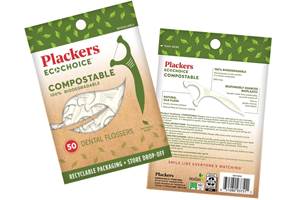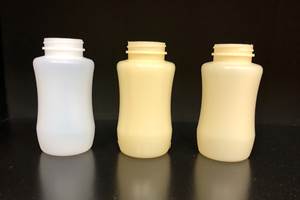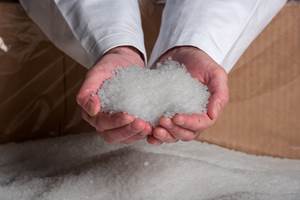Seems like Dr. Saurabh Naik was ahead of his time in this whole circular economy proposition. He started looking for markets for recycled post-industrial scrap back in the 1980s. In 1978, he had earned his PhD in Polymer Chemistry from U-Mass Lowell, then spent some time with Martin Marietta and International Paper doing R&D work on incorporating mica as a filler in thermoplastic formulation.
Today, Naik is founder and CEO of Niche Polymer LLC, One of its product lines is called PoliPCR, made from post-consumer reclaim for applications that include automotive interior trim, under-hood components, lighting, window profiles, flooring, wall coverings, and consumer durables such as furniture and appliances. PoliPCR is based on PP, nylon 6, nylon 66, PC, ABS and PBT.
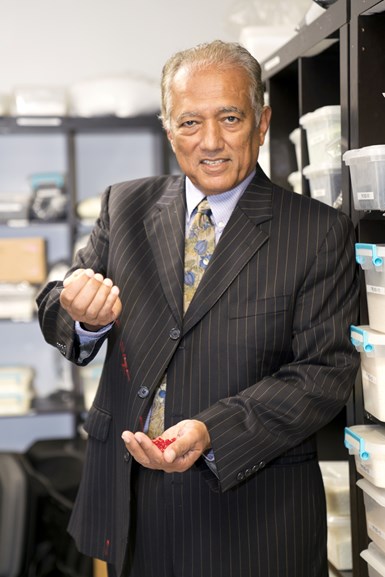
Niche Polymer’s CEO Dr. Saurabh Naik was ahead of his time in seeking markets and applications for plastic scrap. Photos: Niche Polymers
Says Sunny Naik, son of the founder and v.p. operations for Niche Polymer, ““We believe in proactive support for sustainability through collaboration with resin suppliers, molders and OEMs to divert plastic waste from the environment, increase recycling and incorporate post-consumer recycled content in value-added products. Ethical sourcing of our material streams is our social responsibility. Sustainability is our ability to repeat the process at a consistent rate.”
Niche Polymer operates plants in Ravenswood and Washington, W. Va., Nesquehoning, Pa., and Killen, Ala., and has distribution facilities in both Washington and Toronto. Schedule to open this year is an 80,000 ft2 plant in Muscle Shoals, Ala., that will focus on soft polymers (TPEs and TPVs).
The company plans on equipping the plant with up to three new twin-screw compounding lines. It will focus on supplying automotive OEMs in the Southeast. Also, this year Niche opened a PCR-focused plant in Florence, S.C. Next year, Niche will open a compounding plant in Queretaro, Mexico, and a tech-service and distribution center in Texas. The plant in Nesquehoning came about as a result of Niche’s 2021 purchase of Ametek/Westchester Plastics, which added grafting, reactive compounding and tolling services to the company’s capabilities.

Niche Polymer’s compounding operation is supported by state-of-the-art twin-screw extrusion technology. The company runs 18 lines across its various plants.
Dr. Naik spent much of his early career in polymers, focusing on reclaim. In 1987, when Niche was founded, he sold scrap from Black & Decker’s manufacturing processes to China and India. As he secured more sources of supply, he opened a recycling plant in Baltimore to perform size reduction and baling. By the 1990s, he was shipping 20 million lb/yr of scrap to China, which was looking for lower-cost materials to support a burgeoning injection molding market.
At the turn of the century, the reclaim market was becoming a bit more sophisticated. “Chemical prices were high, so virgin resins were expensive,” Dr. Naik recalls. “We were collecting plenty of scrap, but our challenge became adding value to it.” In 2001, Niche opened its flagship plant in Washington, next to a DuPont plant, providing value-added services to the then-giant resin company by sorting bad batches and returning pristine lots to the polymer producer. In 2008, Niche Polymer started compounding in Ravenswood in a former fiber plant purchased from DuPont.
Ravenswood was expanded twice as Niche began to develop proprietary products. In 2014, Niche added two compounding lines, while its R&D Lab received ISO 17025 accreditation. Three years later, Niche added a line for polyolefin and polystyrene compounding. Ravenswood currently has capacity of 150 million lb/yr. Products produced there are mostly nylon-based, including glass-filled, mineral-filled, impact modified and high-temperature grades.
Niche also produces PC/ABS alloys and PIR glass-filled PP at this plant. The nearby facility in Washington operates as Polymer Alliance Services. That 400,000 ft2 facility is used as Niche’s central material storage and distribution center; however, it engages in a variety of other operations as well: optical sorting, pulverizing, cryogenic grinding, bagging, blending, drying and more.
Then in 2020, Niche added capacity for TPE and TPO formulating with the purchase of Polymer Technology Services (PTS) in Heath, Ohio. PTS compounds PP, PE, TPO, ABS, PC, nylon 6, nylon 66, PBT and their alloys. PTS was established in a 60,000 ft2 facility with two employees and has grown to more 40 employees. The plant was built with a fully equipped lab from the start. In January 2011, PTS opened an additional 80,000 ft2 recycling facility in Hebron, Ohio, more than doubling its processing and warehousing space.
“We were collecting plenty of scrap, but our challenge became adding value to it.”
The 2021 purchase of Ametek/Westchester Plastics added roughly 220 million lb of capacity to the mix. Westchester Plastics is the nation’s leading independent toll compounder of engineering resins, alloys, blends, reactive modifiers and other thermoplastic materials.
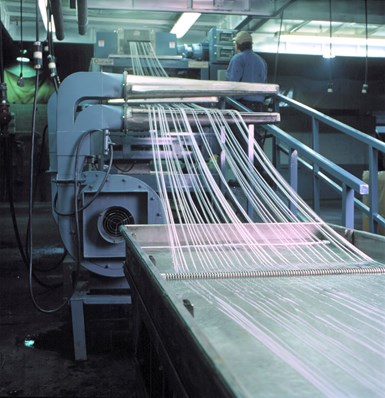
Niche Polymer expanded tolling business with its 2021 purchase of Ametek, Westchester Plastics, said to be North American’s largest toll compounder.
Across all its plants, Niche Polymers runs 18 compounding lines on a 24/5 basis. It estimates its growth in 2022 to be about 30%. Roughly 100 million lb/yr of its capacity is from its proprietary products:
- The PoliXL product line includes nylon, PP, PC, ABS and PC/ABS. Custom formulations designed for the most challenging end-use applications are based on nylon 6 and 66, PP, PC, PC/ABS, ABS, PBT, acetal and other engineered materials. These compounds range from unreinforced, impact-modified and glass-reinforced products to flame-retardant and custom-modified materials. The PoliXL resin family includes 100% prime resin grades engineered for industries seeking high-performance materials.
• PoliPIR certified products have 100% post-industrial recycled (PIR) content and are designed for applications that require standard certified products with PIR content to provide cost savings.
• PoliSP soft polymers are based on SEBS and resemble vulcanized rubber but can be processed like thermoplastics. Applications include gaskets, cable jacketing and soft-touch overmolding.
• PoliPCR products are custom compounds of nylon 6 and 66 and PPC (polypropylene carbonate, a copolymer of carbon dioxide and propylene oxide). PCR content can also be customized. PCR feed streams are based on consistent materials and the process is optimized to create clean, reliable compounding feedstock for internal use. Key sources of feedstock material for Niche Polymer here are nylon fishing nets (some 640,000 tons of which are landfilled a year), carpeting, clothes hangers, pallets, sign scrap and PP labels from PET soda bottles. The plant in Florence is Niche Polymer’s PCR collection facility, and does sorting, washing, size reduction, metal detection, densification, blending and packaging.
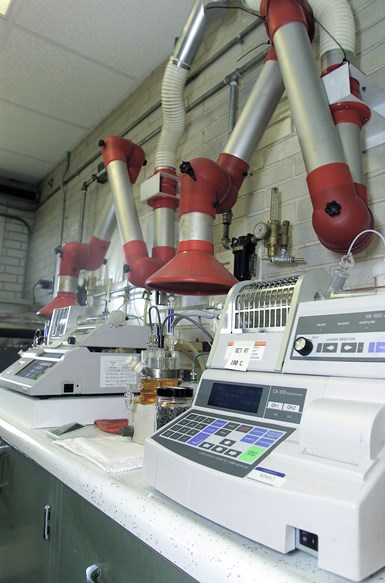
All of Niche Polymer’s facilities are supported by the latest in laboratory and testing equipment.
Because of the depth and breadth of its product line, Niche Polymer competes in a wide range of end markets. This include automotive, building and construction, consumer durables such as furniture and appliances, electronics, plumbing, power tools, sporting goods and toys.
Automotive figures to be a hot spot for future product development at Niche Polymer, remarks Thomas Moccia, v.p. sales and marketing. Already, Niche provides material solutions for light vehicles; antimicrobial polymers for high-touch parts like steering wheels, displays and door handles; carbon-fiber reinforced polymers for strong, lightweight body panels, roof panels and wheels; and materials that provide strength and safety in electric vehicle batteries and bumper systems.
But car makers are also pushing their material suppliers for grades containing up to 30% PCR for instrument panels and other interior components. “The OEMs want to market PCR as value-added materials, and we work regularly with their development teams on programs to develop compounds that are fit for the purpose.”
Related Content
Breaking News From NPE2024
Here is a firsthand report of news in injection molding, extrusion, blow molding and recycling not previously covered.
Read MoreHow to Optimize Injection Molding of PHA and PHA/PLA Blends
Here are processing guidelines aimed at both getting the PHA resin into the process without degrading it, and reducing residence time at melt temperatures.
Read MoreHow to Extrusion Blow Mold PHA/PLA Blends
You need to pay attention to the inherent characteristics of biopolymers PHA/PLA materials when setting process parameters to realize better and more consistent outcomes.
Read More‘Monomaterial’ Trend in Packaging and Beyond Will Only Thrive
In terms of sustainability measures, monomaterial structures are already making good headway and will evolve even further.
Read MoreRead Next
People 4.0 – How to Get Buy-In from Your Staff for Industry 4.0 Systems
Implementing a production monitoring system as the foundation of a ‘smart factory’ is about integrating people with new technology as much as it is about integrating machines and computers. Here are tips from a company that has gone through the process.
Read MoreMaking the Circular Economy a Reality
Driven by brand owner demands and new worldwide legislation, the entire supply chain is working toward the shift to circularity, with some evidence the circular economy has already begun.
Read MoreBeyond Prototypes: 8 Ways the Plastics Industry Is Using 3D Printing
Plastics processors are finding applications for 3D printing around the plant and across the supply chain. Here are 8 examples to look for at NPE2024.
Read More










